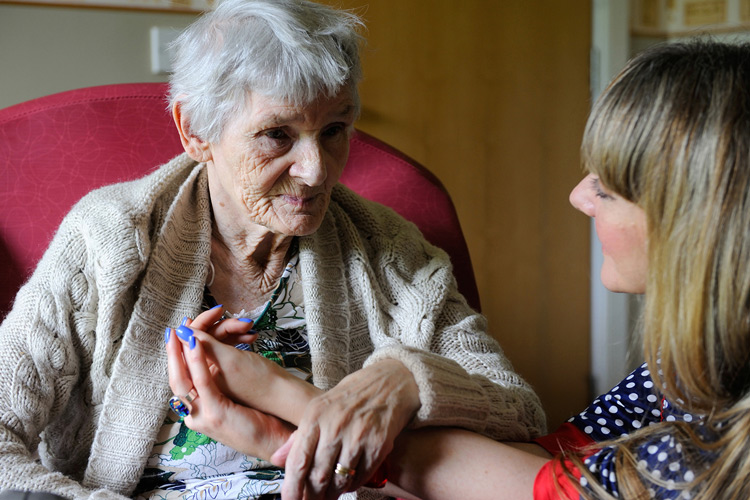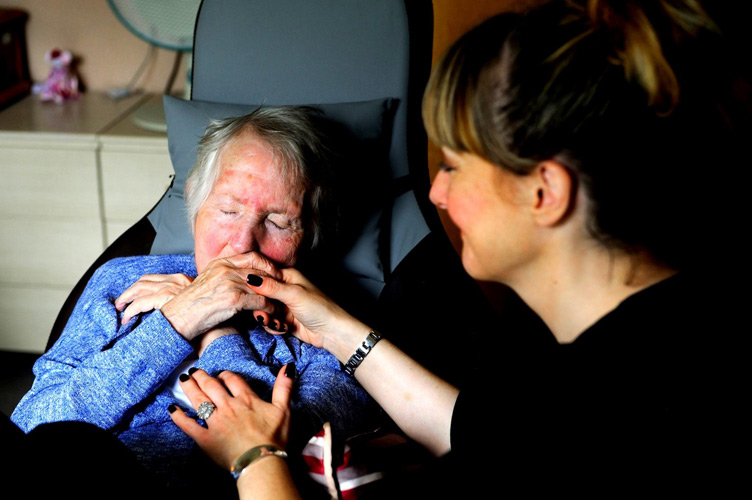Without words

Alzheimer’s disease (AD) is a neurodegenerative condition that slowly destroys memory and thinking skills and, eventually, the ability to carry out the simplest of tasks. AD is a form of dementia, which is defined as the progressive loss of cognitive function — thinking, remembering, and reasoning — to such an extent that it interferes with a person's daily life and activities. In the advanced stages, the ability to speak and understand speech is often lost. Scottish Care estimates that between 12,000 and 15,000 people with advanced dementia are currently living in Scottish care homes.
The lack of awareness of the communicative capacities of individuals with advanced dementia is detrimental to the wellbeing of those living with the condition, their professional carers and family members. They can become ignored and isolated. Professional caregivers can feel unable to communicate with those for whom they care, and family members can feel disconnected from their loved ones. This issue and the search for a solution, has been the focus for Dr Maggie Ellis’s research.
As an undergraduate Maggie volunteered to work with Alzheimer Scotland daycare service in Dundee as part of her degree. She enjoyed the humanity of working with individuals living with dementia, their families, and their carers. Maggie loved this work to the point that she changed her career path away from clinical psychology, taking up a position as an RA on a dementia project at the University of St Andrews, under Arlene Astell.
In 2004 Maggie was invited to a conference on Intensive Interaction: a communication intervention developed for people with profound and multiple learning disabilities. The conference outlined how this approach could be applied to different clinical populations. These populations included those individuals that had suffered a stroke or who were congenitally deaf-blind, and those on the autism spectrum. Maggie immediately saw the similarities between these populations and those with very advanced dementia where social interactions were very limited.
Maggie and her supervisor adapted the technique and worked with an individual with advanced dementia. The results were amazing. Edie came to life – the noticeable difference in her was remarkable and the techniques used were so simple. And so Adaptive Interactions was born. At the heart of Adaptive Interaction is the absolute base level desire of people with advanced dementia to communicate (despite loss of language production and comprehension) and their preserved capabilities to interact nonverbally.
What then follows is educating the public to these capabilities and desires. “Any non-verbal behaviour can be seen as a means of communicating, meaning that very disabled people’s lives could be given some meaning”. Adaptive Interaction is very much a practical approach to communication: observing body behaviour, reflecting sounds, mirroring movements, eye contact, hand holding.
Arguments against any attempt to interact with individuals with advanced dementia are based around the fact that they are likely to have no recollection within minutes or hours so why bother? Why bother? – it’s simple. Everyone involved feels a connection – a connection that is craved and long since missed and this leads to a sense of calm – for both people with dementia and their families or carers. Families can have moments of connection with their loved ones, for however brief a moment it may be.
Maggie’s work has won rave reviews from many of those that have encountered it – from the carers she has trained, to the families that benefit from the interaction to professional bodies. She now trains carers and service providers – often in her own time and free of charge - and the benefits have been immediate and obvious. To be able to share a few moments of connection and love in what seems to be a sea of desperate loss – who wouldn’t want that?
Reaching people with severe dementia: Adaptive Interaction in action (video).
